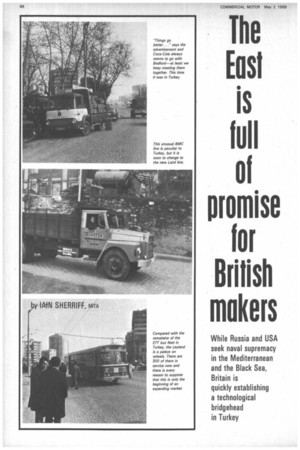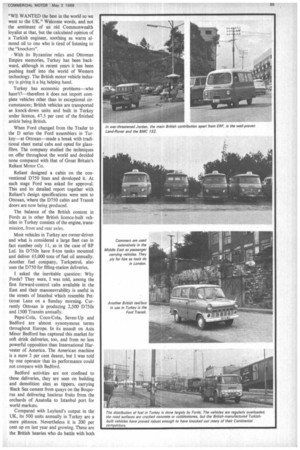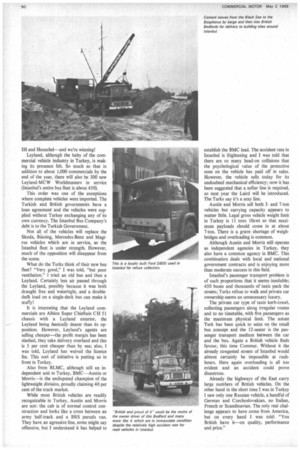• The East is full of promise for British makers
Page 90

Page 91

Page 92

If you've noticed an error in this article please click here to report it so we can fix it.
While Russia and USA seek naval supremacy in the Mediterranean and the Black Sea, Britain is quickly establishing a technological bridgehead in Turkey
"WE WANTED the best in the world so we went to the UK." Welcome words, and not the sentiment of an old Commonwealth loyalist at that, but the calculated opinion of a Turkish engineer, soothing as warm almond oil to one who is tired of listening to the "knockers".
• With its Byzantine relics and Ottoman Empire memories, Turkey has been backward, although in recent years it has been pushing itself into the world of Western technology. The British motor vehicle industry is giving it a big helping hand.
Turkey has economic problems—who hasn't?—therefore it does not import complete vehicles other than in exceptional circumstances; British vehicles are transported as knock-down units and built in Turkey under licence, 47.5 per cent of the finished article being British.
When Ford changed from the Trader to the D series the Ford assemblers in Turkey—at Ottosan—made a break with traditional sheet metal cabs and opted for glassfibre. The company studied the techniques on offer throughout the world and decided none compared with that of Great Britain's Reliant Motor Co.
Reliant designed a cabin on the conventional D750 lines and developed it. At each stage Ford was asked for approval. This and its detailed report together with Reliant's design specifications were sent to Ottosan, where the D'750 cabin and Transit doors are now being produced.
The balance of the British content in Fords as in other British licence-built vehicles in Turkey consists of the engine, transmission, front and rear axles.
Most vehicles in Turkey are owner-driven and what is considered a large fleet can in fact number only 11, as in the case of BP Ltd. Its D750s have 8-ton tanks mounted and deliver 65,000 tons of fuel oil annually. Another fuel company, Turkpetrol, also uses the D750 for filling-station deliveries.
I asked the inevitable question: Why Fords? They were, I was told, among the first forward-control cabs available in the East and their manoeuvrability is useful in the streets of Istanbul which resemble Petticoat Lane on a Sunday morning. Currently Ottosan is producing 2,500 D750s and 1500 Transits annually.
Pepsi-Cola, Coco-Cola, Seven-Up and Bedford are almost synonymous terms throughout Europe. In its assault on Asia Minor Bedford has captured this market for soft drink deliveries, too, and from no less powerful opposition than International Harvester of America. The American machine is a mere 2 per cent dearer, but I was told by one operator that its performance could not compare with Bedford.
Bedford activities are not confined to these deliveries, they are seen on building and demolition sites as tippers, carrying Black Sea cement from quays on the Bosporus and delivering luscious fruits from the orchards of Anatolia to Istanbul port for world markets.
Compared with Leyland's output in the UK, its 500 units annually in Turkey are a mere pittance. Nevertheless it is 200 per cent up on last year and growing. These are the British heavies who do battle with both III and Henschel—and we're winning!
Leyland, although the baby of the commercial vehicle industry in Turkey, is making its presence felt. So much so that in addition to about 1,000 commercials by the end of the year, there will also be 300 new Leyland-MCW Worldmasters in service (Istanbul's entire bus fleet is about 450).
This order was one of the exceptions where complete vehicles were imported. The Turkish and British governments have a loan agreement and the vehicles were supplied without Turkey exchanging any of its own currency. The Istanbul Bus Company's debt is to the Turkish Government.
Not all of the vehicles will replace the Skoda, Bussing, Mercedes-Benz and Magirus vehicles which are in service, as the Istanbul fleet is under strength. However, much of the opposition will disappear from the scene.
What do the Turks think of their new bus fleet? "Very good," I was told, "but poor ventilation." I tried an old bus and then a Leyland. Certainly less air passed through the Leyland, possibly because it was both draught free and watertight, and a doubledect load on a single-deck bus can make it stuffy!
It is interesting that the Leyland commercials are Albion Super Chieftain CH 51 chassis with a Leyland exterior, the Leyland being basically dearer than its opposition. However, Leyland's agents are selling cheaper—the profit margin has been slashed, they take delivery overland and this is 5 per cent cheaper than by sea; also, I was told, Leyland has waived the licence fee. This sort of initiative is putting us in front in Turkey.
Also from BLMC, although still an independent unit in Turkey, BMC—Austin or Morris—is the undisputed champion of the lightweight division, proudly claiming 40 per cent of the truck market.
While most British vehicles are readily recognizable in Turkey, Austin and Morris are not: the cab is of normal control construction and looks like a cross between an army half-track and a BRS parcels van. They have an agressive line, some might say offensive, but I understand it has helped to establish the BMC lead. The accident rate in Istanbul is frightening and I was told that there are so many head-on collisions that the psychological value of the protective nose on the vehicle has paid off in sales. However, the vehicle sells today for its undoubted mechanical efficiency; now it has been suggested that a softer line is required, so next year the Laird will be introduced. The Turks say it's a sexy line.
Austin and Morris sell both 3and 7-ton vehicles but carrying capacity appears to matter little. Legal gross vehicle weight limit in Turkey is 11 tons lOcwt so that maximum payloads should come in at about 7-ton. There is a grave shortage of weighbridges and overloading is common.
Although Austin and Morris still operate as independent agencies in Turkey, they also have a common agency in BMC. This combination deals with local and national government contracts and is enjoying more than moderate success in this field.
Istanbul's passenger transport problem is of such proportions that it seems insoluble; 450 buses and thousands of taxis pack the streets; Turks refuse to walk and private car ownership seems an unnecessary luxury.
The private car type of taxis kerb-crawl, collecting passengers along irregular routes and to no timetable, with five passengers as the maximum physical limit The astute Turk has been quick to seize on the small bus ,concept and the 12-seater is the passenger transport medium between the car and the bus. Again a British vehicle finds favour, this time Commer. Without it the already congested streets of Istanbul would almost certainly be impossible at rushhours. Here again overloading is all too evident and an accident could prove disastrous.
Already the highways of the East carry large numbers of British vehicles. On the other hand in the short time I was in Turkey I saw only one Russian vehicle, a handful of German and Czechoslovakian, no Italian, French or Scandinavian. The only real challenge appears to have come from America, but on every hand I was told: "You British have it—on quality, performance and price."




















































































































































































































